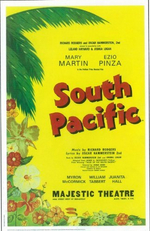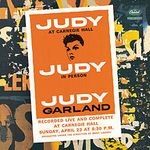Angels in America ending
#1Angels in America ending
Posted: 3/24/18 at 10:24pm
Since there's a separate thread for the MFL ending I'll just talk about my reaction to the Angels in America ending. The more I think of it the more cheaply sentimental it feels. Only Roy Cohn actually dies of AIDS by the end of the 8 hour play, and he is by far the most vile character of the play. While it is true to history (Roy Cohn did die of AIDS), I feel the fact that only the villain of the died of AIDS rings false.
It's not the way AIDS worked/works. AIDS killed the very best people and the very worst (like Cohn) and all the shades of gray in between. It didn't discriminate. I feel like a more realistic ending would have been to have Joe or Harper also die of AIDS. Or Louis. Simply having the most evil character of the play die of AIDS simply isn't true to life.
Anyone else feel this way?
#2Angels in America ending
Posted: 3/24/18 at 10:32pm
You are not alone. Certainly, some folks have always felt that the ending is too sentimental. Including some rogue directors who went their own way. But Prior is the only (confirmed) other character with AIDS in the play, and I don't mind it at all. We don't know how much longer he makes it, and I don't know how bearable the play would be without some kind of hope at the end of so many hours. We don't know anyone's fate down the road, and I think having any of the other major characters suddenly die would have been a really cheap trick.
Updated On: 3/25/18 at 10:32 PM#5Angels in America ending
Posted: 3/24/18 at 10:44pm
TotallyEffed said: "The ending is perfect."
How is it perfect? It's feel good for sure. But by making Cohn die and Prior live there's this idea that AIDS killed Cohn because he was a bad person and the "angels" saved Prior because he was a good person. And that's not true to life at all.
#6Angels in America ending
Posted: 3/24/18 at 10:52pm
Roy Cohn dies because Roy Cohn died. Prior lives because it's nice to have a hopeful ending that doesn't end with the gay guy dying. This show opened during the Aids crisis and there was something incredibly uplifting about the ending. It showed that Aids isn't a death sentence. Maybe Prior died 6 months later or maybe five years later or maybe he's still around today, but it ends with him fighting. I'm happy that the play ends with life instead of death. When the play premiered there was so much death everywhere. We didn't need to see that. We needed to see life and that's what Kushner gives us.
Also, why would Harper die of Aids? She doesn't even have Aids. Neither does Joe or Louis.
#7Angels in America ending
Posted: 3/24/18 at 11:06pm
GeorgeandDot said: "Roy Cohn dies because Roy Cohn died. Prior lives because it's nice to have a hopeful ending that doesn't end with the gay guy dying. This show opened during the Aids crisis and there was something incredibly uplifting about the ending. It showed that Aids isn't a death sentence. Maybe Prior died 6 months later or maybe five years later or maybe he's still around today, but it ends with him fighting. I'm happy that the play ends with life instead of death. When the play premiered there was so much death everywhere. We didn't need to see that. We needed to see life and that's what Kushner gives us.
Also, why would Harper die of Aids? She doesn't even have Aids. Neither does Joe or Louis."
Well that's a weakness in the structure IMO that AIDS is concentrated in the saint (Prior) and the villain (Roy) and evades the characters with the shades of gray (Joe, Louis, Harper, Belize). When I saw the revival recently I thought it was cheap and sentimental to have Prior live after "visiting" heaven. By doing so Kushner made Perestroika in particular a morality play.
It just feels so false. Hell, last night after I went to the Encores! performance of Grand Hotel I went and saw some clips of the OBC and was saddened to find out that David Carroll died of AIDS before he got to make the OBCR.
You only have to look at the creators of Chorus Line to know how much the theater world was ravaged by AIDS.
AIDS killed so many amazing wonderful creative people.
#8Angels in America ending
Posted: 3/24/18 at 11:13pm
No. Death is not the ultimate punishment/suffering; living is harder. Angels in America is about living in America, something that is hard enough only made harder by AIDS. In some way death is emancipation for those who can't take it anymore, which brings me to another point I disagree: I don't think Tony Kushner wrote a heroes v.s. villains story. Roy Cohn was a villain in real life. In Tony's play, he is a human. His false sense of security is gradually eroded as the power of control that has become part of him is taken bit by bit, sometimes by chunk, away from him. The moment before he dies, his insecurity and hunger for love and care are exposed bare to Rosenberg and the audience. I'm not saying this redeems him, but at least this humanizes him and sets him apart from what we traditionally call villains. Also, the angels did not save Prior. Prior returned because he wanted to. Near the end, Prior told the angels something to the effect of "I can't explain why I want to keep living—all I know is that I do" (Not sure this is the exact wording). He chose life despite the hardship and suffering that he has gone through and still will. This earned him the moving Bethesda speech, one beaming with hope and courage. You might want to read the script to take a closer look at the masterpiece Tony has woven.
#9Angels in America ending
Posted: 3/24/18 at 11:16pm
Scarywarhol said: "But Prior is the only other character with AIDS in the play, and I don't mind it at all. We don't know how much longer he makes it, and I don't know how bearable the play would be without some kind of hope at the end of so many hours "
This is very true, I think many people underestimate how much Prior has worsened over those 5 years. The stage directions suggest a very debilitated man that needs a cane to walk even if he's just in his mid-thirties. The mere fact that he wishes to be still living the following year implies that he doesn't have the certainty of being there, because it's not like his condition has improved. Prior doesn't die, but the fact that Kushner specified how worse he got in a few years might also suggest that he's not going to live much longer. Ivo van Hove cut the finale because he thought it was too much of an American feel good happy ending, but it is more than that. It's a very hopeful moment, but not a guarantee that this hope will be a reality for the protagonist.
#10Angels in America ending
Posted: 3/25/18 at 12:09am
While the play was conceived as AIDS was ravaging gay America, most gay men at the time did not have AIDS. However, it was true that the NYC theater community was decimated by the disease.
In choosing to have a character in the play who was a real life person, Kushner kept with reality in having Roy die of AIDS. He was also a “type”: homophobic, anti the notion of a gay identity,, closeted (but obvious), etc. There is always the dramatic satisfaction of seeing the mighty fall, or at least those who think themselves as the mighty. I remember one of the bitchiest insults from that time: “just get AIDS and die!” So at the time, and even now, there is a visceral schadenfreude that many can tap into when they see Roy suffer and die.
I think the Kushner tapped into something very much in the air by the time Perestroika was playing: triple therapy and medication cocktails not only halting the progression toward death but also restoring quality of life . Studies of NRTIs and protease inhibitors in combination to reduce viral load and minimize resistance were coming out in 1995, and by the end of the decade, most people still alive with HIV were on a cocktail. With NNRTIs and then more classes of meds, HIV is now viewed as a chronic disease.
The great work was about to happen, and indeed it was happening as many were in studies at the time.
Re. more characters in the play with AIDS. Louis, Joe, Harper, and Belize could have been infected. It’s possible. It’s also just as possible that they might not have been. And having more illness tales in a cast of 8 main people might have turned it into even more of an AIDS play than it already was.
#11Angels in America ending
Posted: 3/25/18 at 11:11am
The play is not a tragedy.
The play is not a polemic, angry call to action like The Normal Heart that wants to yell “LOOK WHAT YOU ARE DOING TO US.”
It is a gay fantasia. There is a reason Kushner made that the subtitle.
The play is about perseverance and life, and most importantly the need for community in order to persevere. Roy Cohn dies alone and stripped of everything he stole and achieved, the perfect end to a life lived with malevolent selfishness. Joe’s own selfishness, his pursuit of his own happiness and success at the expense of others, similarly makes him alone. The characters that made sacrifices and selfless decisions, even if it took them time to reach those decisions, persevere.
It was written in a time when the gay community needed assurance that they would persevere, that they would have more life.
“It’s not realistic!” is a silly complaint to lodge at a play that features angels, spirits, and shared visions.
JBC3
Broadway Star Joined: 4/9/17
Fanboy99
Understudy Joined: 2/23/18
#13Angels in America ending
Posted: 3/25/18 at 12:43pm
Kad said: "The play is not a tragedy.
The play is not a polemic, angry call to action like The Normal Heart that wants to yell “LOOK WHAT YOU ARE DOING TO US.”
It is a gay fantasia. There is a reason Kushner made that the subtitle.
The play is about perseverance and life, and most importantly the need for community in order to persevere. Roy Cohn dies alone and stripped of everything he stole and achieved,the perfect end to a life lived with malevolent selfishness. Joe’s own selfishness, his pursuit of his own happiness and success at the expense of others, similarly makes him alone. The characters that made sacrifices and selfless decisions, even if it took them time to reach those decisions, persevere.
It was written in a time when the gay community needed assurance that they would persevere, that they would have more life.
“It’s not realistic!” is a silly complaint to lodge at a play that features angels, spirits, and shared visions."
Love your interpretation of the ending!! However just curious, How was Louis selfless at the end?
Also didnt Joe's mother accept him in the end though?
#14Angels in America ending
Posted: 3/25/18 at 12:48pm
Kad said: "Roy Cohn dies alone and stripped of everything he stole and achieved,the perfect end to a life lived with malevolent selfishness. Joe’s own selfishness, his pursuit of his own happiness and success at the expense of others, similarly makes him alone. The characters that made sacrifices and selfless decisions, even if it took them time to reach those decisions, persevere."
How did Louis "make sacrifices and selfless decisions"? He abandoned Prior and embarked on an affair with Joe. Louis is as selfish as Joe.
#15Angels in America ending
Posted: 3/25/18 at 12:52pm
To reduce Angels in America to being a play about AIDS is to fundamentally misunderstand the play. Angels is ultimately a play about...well, everything, but it's largely about hope and perseverance and forgiveness. Roy Cohn may be a villain (and he was in real life), but we also see him experience a real fear of dying and he is confronted directly by the terrible things he's done through the vision of Ethel Rosenberg. While the play is centered around the AIDS crisis, in some ways it's the least important piece of the puzzle when examining what it's really about at its core.
#16I agree
Posted: 3/25/18 at 2:30pm
Take the time to read the oral history project on AIA and you will get the benefit of a fuller perspective. The 'ending' of AIA is not the end of a journey or life. The piece is a snapshot of a point in time and explores what the characters are going through in their lives and how they face and handle change. To see the 'ending' as the end and base a live or die decision on that is not the way I would see it.
As others have said in this thread, for all we know, Prior dies a month later. All we know when we leave him is that he wants to live and has made the choice to fight for life.
iluvtheatertrash
Broadway Legend Joined: 11/9/04
#17I agree
Posted: 3/25/18 at 3:03pm
At the end of the play, Prior is 35 and walking with a cane. The disease has not taken him, but it has certainly taken FROM him.
And Roy is a complex villain. In his final moments, we see him desperate and alone and maybe even remorseful. To label his complexities as simply villainous does a disservice to Kushner’s writing. Which did a service to a true villain.
And then there’s the ultimate point: AIA is not an AIDS play. AIDS is certainly a part of it, but it is not its overwhelming idea. AIA is also about being an American. Whether you’re sick or not. About your outrage and disgust with America and your gratitude for its gifts. About dying from being American as much as dying from having AIDS.
If the 8 hours hang on the balance of Prior’s dying, the point has been missed entirely. The play isn’t about dying. It’s about living.
#18I agree
Posted: 3/25/18 at 3:14pm
Prior is the hero of the play. The ending of the play is incredibly uplifting considering all of the drama that precedes it. Roy Cohn's character gets what he deserves in more ways than one: he dies from AIDS and gets a taste of his own medicine is his final scene with Ethel, where she basically puts him on trail in the same that he treated her. I have seen the HBO film and the play performed live and both versions were incredibly satisfying experiences. I believe that the play was written to provide light where there was way too much darkness at the time.
#19I agree
Posted: 3/25/18 at 9:59pm
poisonivy2 said: "Kad said: "Roy Cohn dies alone and stripped of everything he stole and achieved,the perfect end to a life lived with malevolent selfishness. Joe’s own selfishness, his pursuit of his own happiness and success at the expense of others, similarly makes him alone. The characters that made sacrifices and selfless decisions, even if it took them time to reach those decisions, persevere."
How did Louis "make sacrifices and selfless decisions"? He abandoned Prior and embarked on an affair with Joe. Louis is as selfish as Joe.”
Louis returns, having gone through a trial of his own.
He gets faced with the truth of who Joe is, and what he himself could become, and makes the correct choice.
stepintime2
Swing Joined: 9/24/17
#20What's a fantasy anyway?
Posted: 3/25/18 at 10:33pm
poisonivy2 said: "Simply having the most evil character of the play die of AIDS simply isn't true to life."
So strange, I was definitely expecting a play whose subtitle contains the phrase "a gay fantasia" to be true to life. Haven't we all literally wrestled with an angel to gain entry to heaven in order reject death and keep on living? Hasn't at least one of us taken too many valium and ended up hallucinating into someone's dream or dreamt our way into someone else's hallucination?
Remember when you last went to the mormon visiting center and the dummies came to life and walked out?
#21What's a fantasy anyway?
Posted: 3/25/18 at 10:42pm
stepintime2 said: "poisonivy2 said: "Simply having the most evil character of the play die of AIDS simply isn't true to life."
So strange, I was definitely expecting a play whose subtitle contains the phrase "a gay fantasia" to be true to life. Haven't we all literally wrestled with an angel to gain entry to heaven in order reject death and keep on living? Hasn't at least one of us taken too many valium and ended up hallucinating into someone's dream or dreamt our way into someone else's hallucination?
Remember when you last went to the mormon visiting center and the dummies came to life and walked out?
"
Maybe I misspoke. I don't want Angels in America to be a kind of ultra-realistic drama. I do however think that ALL great plays need to be emotionally true. And something about the optimism of the ending with Prior's new little family feels forced and sentimental. Yes the "great work" needs to continue but in NYC in the 1990's the "great work" was being done by people who all had experienced severe loss. I don't know of a single person who lived in NYC in the 1990's who didn't know multiple people who had died of AIDS. Hell, I remember one year my mom did not have any sick days left because she donated them all to people in her office who were dying of AIDS.
It just feels that Kushner was trying to force a "happy" ending by juxtaposing Cohn's tormented death with Prior's new lease on life.
#22What's a fantasy anyway?
Posted: 3/25/18 at 10:58pm
poisonivy2 said: "TotallyEffed said: "The ending is perfect."
How is it perfect? It's feel good for sure. But by making Cohn die and Prior live there's this idea that AIDS killed Cohn because he was a bad person and the "angels" saved Prior because he was a good person. And that's not true to life at all."
Angels swooping down telling humans they are prophets isn’t all that true to life either, yet here we are. Just leave it be.
Fanboy99
Understudy Joined: 2/23/18
#23What's a fantasy anyway?
Posted: 3/26/18 at 12:16am
Kad said: "poisonivy2 said: "Kad said: "Roy Cohn dies alone and stripped of everything he stole and achieved,the perfect end to a life lived with malevolent selfishness. Joe’s own selfishness, his pursuit of his own happiness and success at the expense of others, similarly makes him alone. The characters that made sacrifices and selfless decisions, even if it took them time to reach those decisions, persevere."
How did Louis "make sacrifices and selfless decisions"? He abandoned Prior and embarked on an affair with Joe. Louis is as selfish as Joe.”
Louis returns, having gone through a trial of his own.
He gets faced with the truth of who Joe is, and what he himself could become, and makes the correct choice."
This makes Joe's fate sound really depressing and cynical. Kind of also goes against the whole point of the play I feel.
#24What's a fantasy anyway?
Posted: 3/26/18 at 11:09am
poisonivy2 said: "
Maybe I misspoke. I don't want Angels in America to be akind of ultra-realistic drama. I do however think that ALL great plays need to be emotionally true. And something about the optimism of the ending with Prior's new little familyfeels forced and sentimental. Yes the "great work" needs to continue but in NYC in the 1990's the "great work" was being done by people who all had experienced severe loss. I don't know of a single person who lived in NYC in the 1990's who didn't know multiple people who had died of AIDS. Hell, I remember one year my mom did not have any sick days left because she donated them all to people in her office who were dying of AIDS.
It just feels that Kushner was trying to force a "happy" ending by juxtaposing Cohn's tormented death with Prior's new lease on life."
You seem to be filling in the considerable blanks in the epilogue (after all, all we are given is that Prior is alive, it's been five years, and that the four characters remain friends) in a way that supports your argument. Who's to say who's been lost and what the characters have been up to? Maybe Belize's man uptown died. Maybe Prior has been doing nothing but ACT UP protests. We don't know.
And it should be pointed out that "the Great Work" isn't specifically the great work of dealing with AIDS.
#25What's a fantasy anyway?
Posted: 3/26/18 at 11:12am
Fanboy99 said: "This makes Joe's fate sound really depressing and cynical. Kind of also goes against the whole point of the play I feel."
Joe's fate has been given a lot of discussion since the plays premiered. Unlike the other central characters, there's no real resolution for him or even a particular hint of one.
Videos












